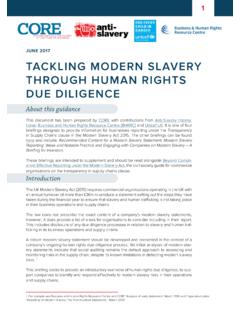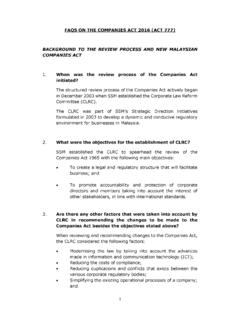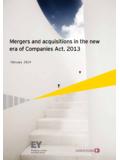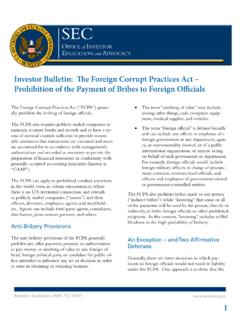Transcription of The Companies Act 2006: Directors’ Duties Guidance
1 The Companies Act 2006 : Directors Duties GuidanceBy David Chivers QCThe Companies Act 2006 : Directors Duties GuidanceBy David Chivers QCPublished in October 2007 by The Corporate Responsibility (CORE) Coalition2 The Companies Act 2006 : About the AuthorDavid Chivers QC specialises in company law, which he practices from Erskine Chambers. David s practice encompasses both litigation and advisory work in the fi elds of company law and corporate insolvency. He advises on all aspects of the Companies Acts including issues of directors Duties . David has extensive experience of acting both for the Department for Business, Enterprise and Regulatory Reform (DBERR, formerly the Department of Trade and Industry) seeking disqualifi cation orders against directors, and for directors defending such proceedings. David provided advice to The Corporate Responsibility (CORE) Coalition during its campaign around the Companies Act 2006 and negotiated proposed amendments to this Act with the DTI and government ministers on questions of directors by The Corporate Responsibility (CORE) CoalitionThe Corporate Responsibility (CORE) Coalition represents over 130 civil society organisations, including development, environment and human rights groups, trade unions and progressive businesses campaigning for a stronger rules-based approach to tackling irresponsible corporate behaviour.
2 During the passage of the Companies Bill through Parliament in 2006 , The Corporate Responsibility (CORE) Coalition lead a campaign for the strengthening of non-fi nancial reporting requirements and the revision of directors Disclaimer(1) This guide provides advice on the actions required by directors in order to ensure compliance with the directors Duties as codifi ed in the Companies Act 2006 . The Corporate Responsibility (CORE) Coalition welcomes these new provisions as a step towards ensuring full transparency, accountability and responsibility in relation to the environmental and social impacts of UK Companies wherever in the world they operate. The coalition will continue its campaigning over the coming years in order to ensure more stringent regulation in this area so as to create a level playing fi eld for responsible businesses.(2) The law on directors Duties is complex. Much of it is new. This guide is intended as a general introduction to the subject and is no substitute for proper professional advice in any particular case.
3 Neither The Corporate Responsibility (CORE) Coalition nor David Chivers QC accept legal responsibility to any person in respect of the material in this guide or any omission from Duties GuidanceIntroduction 4 Purpose of this document 4 Background 4 Readership 5 Provisions 6 Directors Duties 6 Exercise of Powers 9 Independence 10 Standard of Skill and Care Required 11 Confl icts of Interest 12 The No Bribe Rule 13 Action Points 15 Sanctions & Penalties 21 Going Beyond the Bare Minimum Further Information on CSR Best Practice 22 Annex The Business Review 23 Contents4 The Companies Act 2006 : Purpose of this documentThis guide is intended to assist directors of private and public limited Companies incorporated or operating in the United Kingdom in understanding their statutory Duties under the Companies Act 2006 . It pays particular attention to the new codifi cation of the Duty to promote the success of the company .The new legislation has not yet been the subject of any legal Guidance from the , by following the Guidance set out below, directors can expect to protect themselves from claims for breach of duty and from actions to disqualify them from offi ce.
4 The Guidance sets out the responsibilities of directors, under this Act, in respect of their management of the company. It covers all decisions of directors, whether made: at a formal board meeting informally between directors in committee or as a sole director. The guide focuses on the material that directors require properly and lawfully to make decisions. It is important that directors ensure that managers and support staff are aware of their obligations to provide such material to the Guidance introduces the Duties of company directors as set out in the Act and then details Action Points intended to provide a clear platform upon which directors can build their own procedures to ensure compliance with their Duties under the guide is not intended to be a complete statement of the law on directors Duties . It does not deal with the more routine administrative obligations of directors. Nor does it address in any detail the obligations of directors when a company is or may become insolvent.
5 These are matters upon which directors should take immediate advice from a suitably qualifi ed person. BackgroundOn 8 November the Companies Act 2006 , the biggest reform of UK company law for 150 years, received Royal Assent and became law. The Act contains revised measures on a wide range of issues, including: fi nancial and non-fi nancial reporting, company communications with shareholders, and the Duties of company directors. In relation to the latter, the Act maintains a primary duty on directors to act in the interests of shareholders. However, it also requires that in fulfi lling this duty directors specifi cally have regard to a number of other matters, including: the likely consequences of any decision in the long term; the interests of the company s employees; the need to foster the company s business relationships with suppliers, customers and others; and the impact of the company s operations on the community and the environment. Introduction5 Directors Duties GuidanceAll provisions under Part 10 A company s directors of the Companies Act, other than provisions relating to directors confl icts of interest, directors residential addresses and underage and natural directors, come into force on 1 October 2007.
6 The remaining provisions of Part 10 come into force on 1 October 2008. The Companies Act 2006 is the largest UK Act ever, with 1,300 sections. Approximately one third of the provisions are simply a restatement of the previous company law in a way that is intended to be clearer and easier to understand. The Act replaces the company law provisions in the following pieces of legislation: 1985 Companies Act 1989 Companies Act 2004 Companies (Audit, Investigations and Community Enterprise) Act (except for provisions on community interest Companies and provisions on investigations which are either self standing or apply more widely than merely to Companies ). Further information about the Act, including the full text and timetables for implementation are available on the website of the Department for Business, Enterprise and Regulatory Reform (DBERR) at: During the passage of the Companies Bill through Parliament, the Government committed to provide non-statutory Guidance on the statutory statement of directors general Duties in the Bill.
7 The Government has yet to issue this Guidance , but in the meantime it has made available a compilation of Ministerial statements on the purpose and meaning of the new directors Duties provisions made during the passage of the Bill through Parliament. This document is available on the DBERR website at the following website linkCompanies Act 2006 Duties of Company Directors: Ministerial les/fi ReadershipThis guide is intended to be read by all directors of Companies . It is important both that directors working in the business and non-executive directors are fully aware of their responsibilities under the Act. This guide should also be read by managers or support staff who are not themselves directors, but who prepare board packs, briefi ng materials, and other information for Companies Act 2006 : Directors DutiesThe Companies Act 2006 includes the fi rst ever statement in statute of directors Duties in respect of the environmental and social impacts of their Companies business.
8 The new law explicitly enables directors to take into regard these issues, highlighting the important link between responsible business behaviour and business success. What does the Act say?In terms of the directors duty to promote the success of the company, the Companies Act 2006 states the following:172 Duty to promote the success of the company(1) A director of a company must act in the way he considers, in good faith, would be most likely to promote the success of the company for the benefi t of its members as a whole, and in doing so have regard (amongst other matters) to (a) the likely consequences of any decision in the long term, (b) the interests of the company s employees, (c) the need to foster the company s business relationships with suppliers, customers and others, (d) the impact of the company s operations on the community and the environment, (e) the desirability of the company maintaining a reputation for high standards of business conduct, and (f) the need to act fairly as between members of the company.
9 (2) Where or to the extent that the purposes of the company consist of or include purposes other than the benefi t of its members, subsection (1) has effect as if the reference to promoting the success of the company for the benefi t of its members were to achieving those purposes.(3) The duty imposed by this section has effect subject to any enactment or rule of law requiring directors, in certain circumstances, to consider or act in the interests of creditors of the has changed?The language previously used (by the courts) to describe the obligations of a director were that the director had to act bona fi de in the best interests of the company . In essence, this obligation is repeated in the Act, the obligation of good faith remains and it is the company s interests, defi ned as the benefi t of its members as a whole, that must be has changed is that the Act now prescribes not only the basic duty of the director, but how the director must go about discharging that duty.
10 The director must now have regard to the specifi c matters set out in section 172(1)(a)-(f). While competent directors have previously had regard to these matters, that process is now part of the directors statutory obligation. What does this mean in practice?Before the Act was passed, concern was expressed that setting out a list of matters to which directors were to have regard would lead to all decisions of directors Provisions 7 Directors Duties Guidancebeing made only after a formal box ticking exercise had been conducted. It was feared that this would lead to an increased administration burden but no substantive change in directors behaviour. The Government responded as follows: DTI (June 2007) Companies Act 2006 : Duties of Company Directors: Ministerial Statements The words have regard to mean think about ; they are absolutely not about just ticking boxes. If thinking about leads to the conclusion, as we believe it will in many cases, that the proper course is to act positively to achieve the objectives in the clause, that will be what the director s duty is.











